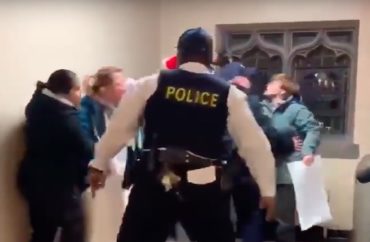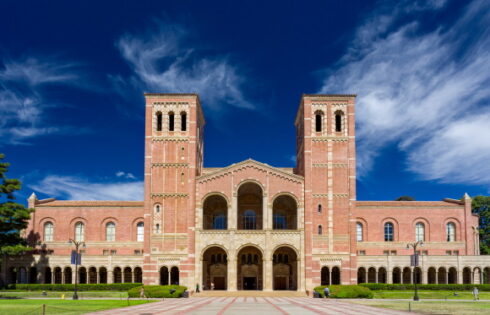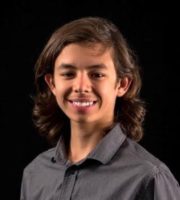
UPDATED
‘A decidedly mixed reception’
Northwestern University’s student government is unwilling to acknowledge on the record that “all people” on campus “have the right to free speech and free expression.”
Earlier this month it narrowly voted to indefinitely table the free speech resolution submitted by Daily Northwestern columnist Zach Kessel. It was inspired by the disruptive student protest against former Attorney General Jeff Sessions when he spoke on campus in November.
The Daily found itself under fire for taking photos of protesters at the Sessions event, which was open to the public, and asking them for comment for its coverage. The editorial board soon apologized for “retraumatizing” them and promised to revise its procedures for newsgathering.
“Labeling certain opinions as ‘dangerous’ or ‘violent’ shuts students out of free discourse that would otherwise allow them to better understand their own points of view,” Kessel told The College Fix, explaining why he offered the resolution.
He received “a decidedly mixed reception” at the Jan. 15 Associated Student Government meeting, with leaders welcoming him to submit the resolution, “but some members of the Senate were very evidently unhappy with it,” he said.
Kessel said he doesn’t know which senators voted to table the resolution. “[P]retty much everyone in the room had only negative things to say” – even those who voted against tabling – “so they all blended together in my mind,” he said. But he knows one of the senators who abstained, Max Emery, who has said that neither he nor other senators wanted to talk about the vote.
MORE: Jeff Sessions protesters are ‘fighting for our lives’
Instead, the student government invited Kessel to join a project called “FreeSpeechNU” that is “meant to address Northwestern’s policies regarding protest and free expression,” he said.
The Fix could not find any information on the student government website or the open internet about a project by that name, and it’s not mentioned in the Daily. Kessel originally told The Fix he hasn’t been given access to even private information about FreeSpeechNU.
“There has been a lot of rescheduling of meetings” on the project, he said. “The goal is to convince the committee to include language similar to my resolution in the final product.”
Kessel provided an update Feb. 2, a day after a meeting of the FreeSpeechNU committee, which he said “went very well”:
The committee had me explain my thoughts on free speech again, and we’re working on policy that both protects speakers and allows for students to protest. The most heartening moment of the meeting was when people in student government acknowledged that conservative students on college campuses feel that their voices aren’t often heard by their fellow students.
There’s no timeline for the committee’s work at this point, but he’s invited to future meetings, Kessel told The Fix: “[T]here is definitely a sentiment in the room that my input is valued.” The next meeting should be scheduled “soon.”
While the Daily told readers in November that it was “working on setting guidelines for source outreach, social media and covering marginalized groups,” a staffer who answered the phone this week told The Fix that nothing has been decided since then. The guidelines will be posted at some point on its website, the person said.
Challenge Sessions with ‘reasoned dialogue,’ not shutdowns
Kessel’s resolution doesn’t directly mention the Sessions incident or the Daily’s apology to protesters, which he previously criticized in a Washington Post op-ed, but he wrote on Twitter that this controversy was the motivation.
“The growing intolerance on college campuses of opinions that don’t align with those of the majority of students has troubled me for several years now,” he tweeted. He asked the student government to “demonstrate that the protestors who attempted to shut down” the Sessions event “are in the minority here” on campus.
Those who disagree with Sessions, as he does on some issues, should “engage in reasoned dialogue” to counter the former attorney general’s viewpoints, Kessel tweeted. He’s not trying to “promote conflict” but seek “a wide range of viewpoints … a lack of real discussion limits our ability to learn.”
The resolution says that Northwestern is among college campuses “that have seen student bodies rising in opposition to freedom of speech,” and that “too often” on campus, “those with minority opinions find themselves drowned by an intolerant majority.”
Northwestern’s mission statement says it’s committed to the “personal and intellectual growth of its students in a diverse academic community,” but these are “impossible without free discourse,” the resolution says.
“Diversity in an academic community” includes intellectual diversity, and it’s “vital that the Northwestern student body stem the tide of this movement against free speech,” it reads.
That is why the Associated Student Government affirms that “all people on the Northwestern University campus have the right to free speech and free expression, as enumerated in the First Amendment to the United States Constitution.”
MORE: Sorry for taking your photos at a public protest
https://twitter.com/ZacharyIKessel/status/1217605560901697539
Kessel told The Fix that he did not get “any expressed support from administrators or faculty” for the resolution, but he believes they “would agree with that free speech is a necessity in any functioning educational environment.”
The Washington Free Beacon reported that that 12-11 vote to table, with three abstentions, closely followed an update on the legal proceeding against protesters arrested at the Sessions event.
The city of Evanston, where Northwestern is located, dropped 11 charges of disorderly conduct against five students who had been arrested by campus police. Their lawyer Molly Armour told the Daily that the students were still “undergoing a separate University process” under Northwestern’s own student code of conduct.
(One student sanctioned by the university claimed not to have been at the protest. An anonymous open letter from “student protesters” claims the police citations they received do not validate the university’s claim that they were “pushing, grabbing or kicking police officers.”)
Stand firm ‘when challenged by the mob’
The Daily has not published an editorial since it apologized to readers for its journalistic practices at the Sessions event, which included taking photos of protesters and using the student directory to ask students for interviews.
“We recognize being contacted like this is an invasion of privacy, and we’ve spoken with those reporters — along with our entire staff — about the correct way to reach out to students for stories,” the Nov. 10 editorial read.
The editors said they decided to “prioritize the trust and safety of students who were photographed” by removing photos of protesters that reporters had posted to their Twitter
Even more so than documenting news at Northwestern, “nothing is more important than ensuring that our fellow students feel safe” and that they are “benefitting from our coverage rather than being actively harmed by it.”
MORE: Harvard student government denounces newspaper for doing its job
Kessel gave a behind-the-scenes glimpse into the editorial discussions in a Nov. 14 Washington Post op-ed. He wrote that staffers waved off the widespread media criticism of its editorial by claiming that “most of the notable critics of the statement write for legacy print publications.”
While he agrees that “the new era of journalism should account for the perspectives of people whose voices haven’t been heard in the past, and that reporters should be more sensitive to their subjects,” the Daily’s response questioned journalism itself.
“No reporter has ever broken a major story without stepping on toes,” he wrote: “If journalists are restricted by the need to ensure that subjects are completely happy with the coverage, they can’t do their jobs.”
He called on editors to stand firm “when challenged by the mob,” and warned his generation of journalists to not “assume that we know what’s right just because we’re the next wave.”
UPDATE: Kessel shared his thoughts from the Feb. 1 meeting of the FreeSpeechNU committee after this article was published. They have been incorporated.
MORE: Journalism school dean rips Jeff Sessions protesters
IMAGE: YAFTV/YouTube
Like The College Fix on Facebook / Follow us on Twitter






Please join the conversation about our stories on Facebook, Twitter, Instagram, Reddit, MeWe, Rumble, Gab, Minds and Gettr.